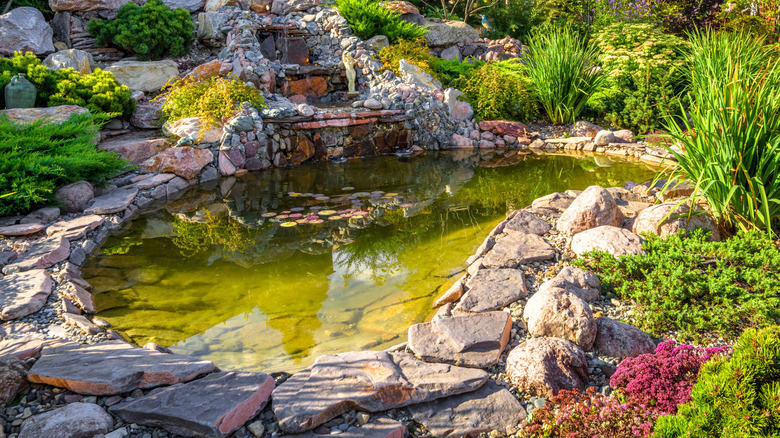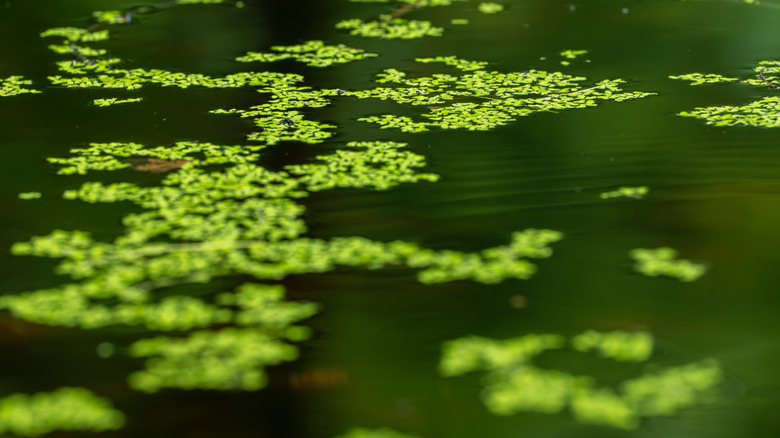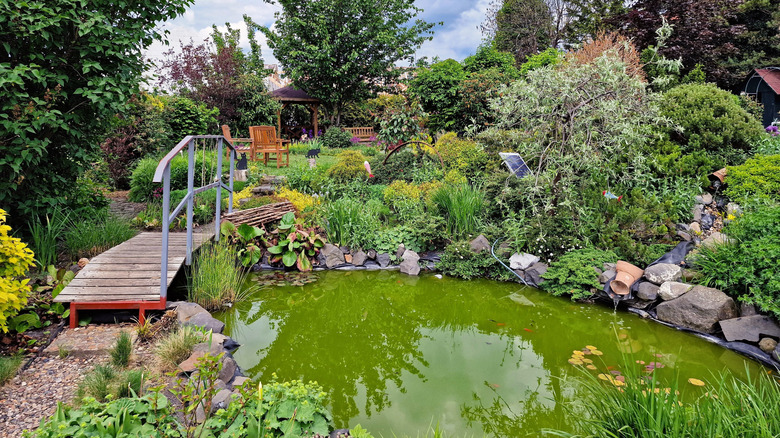What Our Expert Says About Using Hydrogen Peroxide To Keep Your Pond Algae-Free
We may receive a commission on purchases made from links.
If you have a pond on your property, you may find yourself waging a constant battle with the algae that can form therein. Physically cleaning the algae away, introducing plants that can "outcompete" the stuff, and bringing in good bacteria are all good options for removal. However, some pond owners have turned to more unusual tactics to combat algae like adding hydrogen peroxide to the pond's water. One might rightfully question whether this is a good idea, so House Digest consulted expert Jason Blake, founder and president of Armada, Michigan-based service and maintenance company The Pond Guy. In an exclusive interview, Blake explained that while this method sounds effective, it actually has many drawbacks that should put anyone off from trying it.
"There are no reliable methods for monitoring dosage and application [of hydrogen peroxide], which could spell disaster for a pond ecosystem," Blake said. "Household hydrogen peroxide is not classified as an algaecide and is not regulated by the Environmental Protection Agency (EPA) for its strength, effectiveness, or environmental safety." For these reasons, the household cleaner can be extremely detrimental to your pond's health and overall ecosystem. "Hydrogen peroxide does have algicidal properties, meaning it can kill algae. [It can also] kill other things, as well, including the natural beneficial bacteria that are crucial for a healthy pond," Blake noted. "In addition, the chemical can negatively impact fish and other wildlife."
Do not use hydrogen peroxide in your pond
While it can be tempting to try different preventative measures to fight algae, especially one as easy as using a household staple, Jason Blake warns against it. "Hydrogen peroxide can harm fish, amphibians, and other aquatic life by damaging their gills and skin," he told House Digest exclusively. "It also disrupts the balance of microorganisms that are essential to a pond's ecosystem." Blake also noted that using the chemical can cause lasting issues that can ultimately create more problems than it solves. "Hydrogen peroxide will ... alter water chemistry, causing fluctuations in pH and alkalinity, which can further disrupt an aquatic environment," he said.
Blake concluded in no uncertain terms that this "hack" should be avoided, as its risks far outweigh any potential benefits. Using hydrogen peroxide in your pond could create more work for you, and even result in the need to drain it completely and refill it to restore its chemical balance.
Nutrients, filtration, and good bacteria can help with algae
There are many environmental benefits of adding a pond to your garden, and during his conversation with House Digest, Jason Blake exclusively shared some tips for keeping yours in good condition. "The best way to keep a pond clean and algae-free is to address the root cause: nutrient overload," Blake said. He went on to explain that you should "start by using beneficial bacteria treatments to break down excess nutrients." There are also many plants you'll want to keep in your pond to enhance the water quality and help the ecosystem thrive. Blake recommended "adding a quality filtration system [to] help with waste removal, and a bottom-diffused aeration system [to] improve oxygen levels."
Since cleaning your pond is something you should never do with hydrogen peroxide, Blake offered more tips for eradicating algae if it has formed. "Avoid overfeeding fish," he cautioned. "Regular maintenance and debris removal are also key to long-term pond health." Blake added that "if your pond needs a reset to get an algae problem under control [...], use an EPA-registered algaecide, like AlgaeOff or InstaFix."


